#British Library Publishing
Explore tagged Tumblr posts
Text
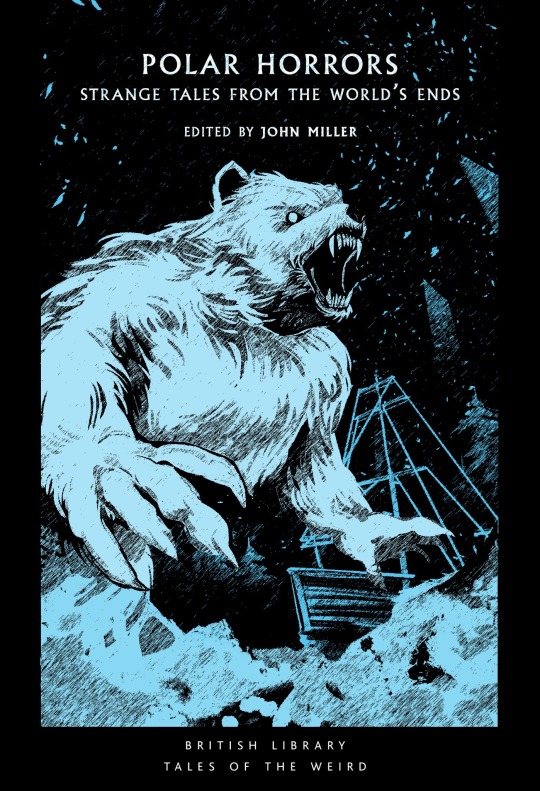
Polar Horrors: Strange Tales from the World’s Ends - ed. by John Miller, cover by Mauricio Villamayor https://x.com/mauriplz?s=21&t=byUtbuJqhxbUuVrYQoPM4g
#horror#British library publishing#sublime#gothic#not really but hush#arctic horror#arctic#vampireharlot#gothic horror
2 notes
·
View notes
Text
More 2024 Horror
I’ve said a few times already that this list or that list is my favourite. But this is such a fantastic collection of books! Fear in the Blood: Tales from the Dark Lineages of the Weird edit. Mike Ashley | 25 / 03 / 24 – British Library Publishing Timothy followed, in his dream, and saw the ungainly, yet agile creature clamber in through the cat-flap… He could hear the flip-flop as it went up…
#2024#Black and White Publishing#Books#British Library Publishing#Delacorte Press#Erewhon Books#Ghost Orchid Press#Horror#John Murray Press#Medusa Publishing Haus#Michael Joseph#Off Limits Press#Parliament House Press#releases#Sliced Up Press#Titan Books#Tor Nightfire#Unbound
0 notes
Text
Cool you're in America, you get to use DCUI to legally read your comics online have you considered: couldn't be me.
#i buy comics and preorder them but if it werent for the webbed sites i would be extrmely limited in what i can read#french libraries dont stock comics#literally all mine has in terms of DC is n52 Batman#so like. yeah i pirate that shit. not like i have much of a choice to do otherwise#something that someone said on locg pissed me off#'oh you should support the comic industry and if you pirate youre lilling it faster' how about the person#i know in russia that doesnt have any publisher that prints comics#like sure support where you can but be aware that tthe fact that youre able to read comics in a fully legal way#is a privilege of being american or british and not a universal experience
9 notes
·
View notes
Text
Average British Fantasy Author of the 20th Century: Born in Hong Kong, raised in Singapore, Kingston and Oxford, he kissed his first girl at the tender age of 38. He spent 23 years obsessively writing notes for his epic masterwork, the Sword of Gormenlia series, with elements drawn from Indian mysticism, Arthurian mythos, Surrealist poetry, Victorian racism and Radical beliefs[?]. He died in Cyprus where he owned the world's most beautiful houseboat.
Average American Fantasy Author of the 20th Century: Born on the border between Ohio and Montana, Wizjeremiah VanderMcDercken, better known by his pseudonym John "Wizard" Whiteman, was raised in a ghost town and was the only citizen of his county who could read. At the age of 14, he stole a car and drove 30 hours straight to New York City to send his first story "The Alien was Really a Man" to Astounding Stories, for which he was paid a whopping 12$. A string of successes followed, including "The Man was Really a Robot" "The Alien was Really a Wizard" and "The Wizard is Really a Man When You Think About It". He harassed Samuel R. Delany for twelve years over a mild criticism of one of his now out-of-print novels. Died in Yonkers where he had a condo.
Average Canadian Fantasy Author of the 20th Century: Born just outside of Toronto
Average French Fantasy Author of the 20th Century: Despite publishing over 170 novels over a period of fifty years, no one outside of France, or indeed within France, knows who Jean Messac is. Left on the steps of a convent in the south of France, he soon learned to hate the nuns, the books in the local library, Parisians, Americans, specifically the citizens of Syria, the Dominican Republic and Bulgaria, the French literary establishment, Regionalist writers, Sartre, De Gaulle, Casimir, anyone who appeared on TV, Radio, Newspapers and Photographs. He lived in a shoebox gifted to him as a joke from André Breton. He was a high school teacher and wrote for a variety of magazines and publishers, was institutionalized three times and was a Majdanek survivor. His books have all been translated in Russia and Japan following a popular JRPG adapting his saga "Pox-Children of the Kamchadals". He died in the same city where he spent his entire life at the age of 64.
11K notes
·
View notes
Text
#yeah i’ll add that to my library holds #op i wonder if you would consider donating copies to the queer liberation library? #they’re always in need of additional aspec books (via @makingtrouble)
I'm not sure if I can, since they're US-based and I'm UK-based, as is my publisher. The ebooks and audiobooks are available to purchase in the US, so there's obviously some kind of US licensing agreement there, but I don't know how it applies to libraries where ebooks function pretty differently; the print edition is only available in the US as an import (again I think there are licensing issues). I can't use the QLL myself as someone outside the US, so I don't have much insight into how it works, and as a traditionally published author, don't have any authority over ebook licensing and things like that.
If there is a way for me as a traditionally published UK-based author to do this, let me know and I will see if it is viable, but the practicalities may be against me here!
Love to write a book with an aroace protagonist and get reviews complaining that it didn't have a love interest :| 99.9%* of YA books have a romance plotline, can we not have 0.1% focused on other kinds of relationship?
Not every book is for everyone, sure, if you're looking for romantic YA then mine isn't for you. But there's a difference between "this book wasn't for me because I prefer romance" and "this book was flawed because it didn't contain romance" and boy, the latter hurts when your life doesn't either.
*Statistics absolutely pulled out of my arse here.
#my publisher tried to get US publishers interested in this trilogy but they did Not want me#it is possibly rather too critical of the military as well as too british in style for them to want it#and from what i can tell UK books don't get imported into the US as much as US books get imported into the UK#it looks like the QLL takes 'donations' in the form of money to cover the cost of your book#but this requires it to be licensed in a form that they can add and that is the part i am not sure about#alas#if my book is available in US libraries at all that presumably means it can be added though so this would be the first thing to find out
2K notes
·
View notes
Text
I don't like wading into Ao3 debates, but I want to give my professional opinion on Ao3 with regard to archives vs. libraries.
I am a professional librarian (MSLS) and I have worked in both archives and public libraries and a lot of the confusion and concern I see surrounding Ao3 is a fundamental misunderstanding of How Archives Work.
An archive is a collection related to a subject. That subject is often a person but sometimes a field or concept or project. And the purpose of an archive is to keep everything. And I mean everything. I was going to say "short of biohazards" but since I know there's a sealed R. Crumb Devil Gal chocolate bar in the UNC Chapel Hill archives, we really do mean everything.
When a collection of materials--which are usually unique and original and can be photos, manuscripts, letters, recordings (audio and/or visual), notes and notebooks, objects, published books, whatever--on and/or from the subject arrive at the archive, they are examined, preserved for longevity, accessioned and cataloged (added to the archive's records), and added to the archive. You measure collections in linear feet. As in, once it's all preserved and boxed and secure, you note how many feet of shelf space it takes up. And some of y'all on Ao3 have a lot of linear feet to your name (and I'm proud of you).
This is an archive: it is designed to preserve the original materials related to a subject. That is its purpose. Archives are how we have the original scroll manuscript of On the Road, for example, or the Lomax recordings of American folksongs, or Tijuana Bibles, or James Joyce's loveletters to Nora.
Now you, a member of the public, can access some archives. Some are easier to access than others. The one I worked in was open to the public; good luck getting into the British Archives without a good reason.
So now apply this to Ao3--which is an archive both in name and in purpose. It is intended to preserve fan-created content long term. And this means everything, whether you personally like the materials or not. It is a repository for as much as possible.
And the "whether you personally like the materials or not" is important, hence why I mentioned Jim's loveletters and Tijuana Bibles in particular. (RIP Jim, you would have loved pegging.)
If it's made by fans and it exists, we should keep it to document the history and progression of fandom. That is the point. We have lost enough materials related to the subject of fans of media and we don't need to lose any more.
The fact of the matter is that Ao3 is only one facet of the OTW, which preserves other fan-related materials (convention booklets and zines, for example). Somehow Ao3, an archive on the subject of fanfiction, has been divorced from the rest of the project, mostly by way of "purity culture" and panic over "dangerous" fiction.
The fact that you can go through an archive and find interesting information is the other side of archives. No, they shouldn't be like the banker's box of old letters stuffed in my closet. Yes, they should be organized and as accessible as is appropriate for the state of the materials.
It's really, really cool to find stuff in an archive, I'm not even going to lie. I have done it before and I will do it again. And yet there are other items in an archive that I might not want or need or be interested in at all--but they're still there. That's the cataloging and accessioning: to keep up with what's there, to stay "on topic" with collecting, and to be able to find things in that archive. Bless the tag wranglers who are doing the cataloging at Ao3.
The pearl clutching seems to come from 1. the creation of "dangerous" fanworks and 2. public access to those "dangerous" fanworks. These are issues of "purity culture" and opinions on censorship and should not involve Ao3.
Ao3, under the umbrella of the OTW, is a documentation and preservation project first and foremost.
13K notes
·
View notes
Text
You're a reasonably informed person on the internet. You've experienced things like no longer being able to get files off an old storage device, media you've downloaded suddenly going poof, sites and forums with troves full of people's thoughts and ideas vanishing forever. You've heard of cybercrime. You've read articles about lost media. You have at least a basic understanding that digital data is vulnerable, is what I'm saying. I'm guessing that you're also aware that history is, you know... important? And that it's an ongoing study, requiring ... data about how people live? And that it's not just about stanning celebrities that happen to be dead? Congratulations, you are significantly better-informed than the British government! So they're currently like "Oh hai can we destroy all these historical documents pls? To save money? Because we'll digitise them first so it's fine! That'll be easy, cheap and reliable -- right? These wills from the 1850s will totally be fine for another 170 years as a PNG or whatever, yeah? We didn't need to do an impact assesment about this because it's clearly win-win! We'd keep the physical wills of Famous People™ though because Famous People™ actually matter, unlike you plebs. We don't think there are any equalities implications about this, either! Also the only examples of Famous People™ we can think of are all white and rich, only one is a woman and she got famous because of the guy she married. Kisses!"
Yes, this is the same Government that's like "Oh no removing a statue of slave trader is erasing history :(" You have, however, until 23 February 2024 to politely inquire of them what the fuck they are smoking. And they will have to publish a summary of the responses they receive. And it will look kind of bad if the feedback is well-argued, informative and overwhelmingly negative and they go ahead and do it anyway. I currently edit documents including responses to consultations like (but significantly less insane) than this one. Responses do actually matter. I would particularly encourage British people/people based in the UK to do this, but as far as I can see it doesn't say you have to be either. If you are, say, a historian or an archivist, or someone who specialises in digital data do say so and draw on your expertise in your answers. This isn't a question of filling out a form. You have to manually compose an email answering the 12 questions in the consultation paper at the link above. I'll put my own answers under the fold. Note -- I never know if I'm being too rude in these sorts of things. You probably shouldn't be ruder than I have been.
Please do not copy and paste any of this: that would defeat the purpose. This isn't a petition, they need to see a range of individual responses. But it may give you a jumping-off point.
Question 1: Should the current law providing for the inspection of wills be preserved?
Yes. Our ability to understand our shared past is a fundamental aspect of our heritage. It is not possible for any authority to know in advance what future insights they are supporting or impeding by their treatment of material evidence. Safeguarding the historical record for future generations should be considered an extremely important duty.
Question 2: Are there any reforms you would suggest to the current law enabling wills to be inspected?
No.
Question 3: Are there any reasons why the High Court should store original paper will documents on a permanent basis, as opposed to just retaining a digitised copy of that material?
Yes. I am amazed that the recent cyber attack on the British Library, which has effectively paralysed it completely, not been sufficient to answer this question for you. I also refer you to the fate of the Domesday Project. Digital storage is useful and can help more people access information; however, it is also inherently fragile. Malice, accident, or eventual inevitable obsolescence not merely might occur, but absolutely should be expected. It is ludicrously naive and reflects a truly unpardonable ignorance to assume that information preserved only in digital form is somehow inviolable and safe, or that a physical document once digitised, never need be digitised again..At absolute minimum, it should be understood as certain that at least some of any digital-only archive will eventually be permanently lost. It is not remotely implausible that all of it would be. Preserving the physical documents provides a crucial failsafe. It also allows any errors in reproduction -- also inevitable-- to be, eventually, seen and corrected. Note that maintaining, upgrading and replacing digital infrastructure is not free, easy or reliable. Over the long term, risks to the data concerned can only accumulate.
"Unlike the methods for preserving analog documents that have been honed over millennia, there is no deep precedence to look to regarding the management of digital records. As such, the processing, long-term storage, and distribution potential of archival digital data are highly unresolved issues. [..] the more digital data is migrated, translated, and re-compressed into new formats, the more room there is for information to be lost, be it at the microbit-level of preservation. Any failure to contend with the instability of digital storage mediums, hardware obsolescence, and software obsolescence thus meets a terminal end—the definitive loss of information. The common belief that digital data is safe so long as it is backed up according to the 3-2-1 rule (3 copies on 2 different formats with 1 copy saved off site) belies the fact that it is fundamentally unclear how long digital information can or will remain intact. What is certain is that its unique vulnerabilities do become more pertinent with age." -- James Boyda, On Loss in the 21st Century: Digital Decay and the Archive, Introduction.
Question 4: Do you agree that after a certain time original paper documents (from 1858 onwards) may be destroyed (other than for famous individuals)? Are there any alternatives, involving the public or private sector, you can suggest to their being destroyed?
Absolutely not. And I would have hoped we were past the "great man" theory of history. Firstly, you do not know which figures will still be considered "famous" in the future and which currently obscure individuals may deserve and eventually receive greater attention. I note that of the three figures you mention here as notable enough to have their wills preserved, all are white, the majority are male (the one woman having achieved fame through marriage) and all were wealthy at the time of their death. Any such approach will certainly cull evidence of the lives of women, people of colour and the poor from the historical record, and send a clear message about whose lives you consider worth remembering.
Secondly, the famous and successsful are only a small part of our history. Understanding the realities that shaped our past and continue to mould our present requires evidence of the lives of so-called "ordinary people"!
Did you even speak to any historians before coming up with this idea?
Entrusting the documents to the private sector would be similarly disastrous. What happens when a private company goes bust or decides that preserving this material is no longer profitable? What reasonable person, confronted with our crumbling privatised water infrastructure, would willingly consign any part of our heritage to a similar fate?
Question 5: Do you agree that there is equivalence between paper and digital copies of wills so that the ECA 2000 can be used?
No. And it raises serious questions about the skill and knowledge base within HMCTS and the government that the very basic concepts of data loss and the digital dark age appear to be unknown to you. I also refer you to the Domesday Project.
Question 6: Are there any other matters directly related to the retention of digital or paper wills that are not covered by the proposed exercise of the powers in the ECA 2000 that you consider are necessary?
Destroying the physical documents will always be an unforgivable dereliction of legal and moral duty.
Question 7: If the Government pursues preserving permanently only a digital copy of a will document, should it seek to reform the primary legislation by introducing a Bill or do so under the ECA 2000?
Destroying the physical documents will always be an unforgivable dereliction of legal and moral duty.
Question 8: If the Government moves to digital only copies of original will documents, what do you think the retention period for the original paper wills should be? Please give reasons and state what you believe the minimum retention period should be and whether you consider the Government’s suggestion of 25 years to be reasonable.
There is no good version of this plan. The physical documents should be preserved.
Question 9: Do you agree with the principle that wills of famous people should be preserved in the original paper form for historic interest?
This question betrays deep ignorance of what "historic interest" actually is. The study of history is not simply glorified celebrity gossip. If anything, the physical wills of currently famous people could be considered more expendable as it is likely that their contents are so widely diffused as to be relatively "safe", whereas the wills of so-called "ordinary people" will, especially in aggregate, provide insights that have not yet been explored.
Question 10: Do you have any initial suggestions on the criteria which should be adopted for identifying famous/historic figures whose original paper will document should be preserved permanently?
Abandon this entire lamentable plan. As previously discussed, you do not and cannot know who will be considered "famous" in the future, and fame is a profoundly flawed criterion of historical significance.
Question 11: Do you agree that the Probate Registries should only permanently retain wills and codicils from the documents submitted in support of a probate application? Please explain, if setting out the case for retention of any other documents.
No, all the documents should be preserved indefinitely.
Question 12: Do you agree that we have correctly identified the range and extent of the equalities impacts under each of these proposals set out in this consultation? Please give reasons and supply evidence of further equalities impacts as appropriate.
No. You appear to have neglected equalities impacts entirely. As discussed, in your drive to prioritise "famous people", your plan will certainly prioritise the white, wealthy and mostly the male, as your "Charles Dickens, Charles Darwin and Princess Diana" examples amply indicate. This plan will create a two-tier system where evidence of the lives of the privileged is carefully preserved while information regarding people of colour, women, the working class and other disadvantaged groups is disproportionately abandoned to digital decay and eventual loss. Current and future historians from, or specialising in the history of minority groups will be especially impoverished by this.
16K notes
·
View notes
Text
youtube
This is the kind stuff that gives me awe and faith in civilization. What a beautiful accomplishment.
1 note
·
View note
Text
Neil Gaiman and Rob Wilkins at the British Library event The Worlds of Terry Pratchett: Neil Gaiman and Rob Wilkins 21.11.2023
Neil: The weirdest bit, the one moment that I remember as being the strangest, most quintessentially writing Good Omens together moment was when we had to copy edit it. And we copy edited it in the basement of Victor Gollancz, which at that point was in 14 Henrietta Street. And the basement was a basement. There were chairs down there, no tables or anything. So we're sitting in these card chairs in this... my recollection is it did have a carpet. And the carpet was kind of damp. You know, beneath that carpet there was sort of strange puddles of... publishing. And Terry and I just sat there and we were both copy editing away. And then there was a point where Terry looked up and chuckled like anything. I said, 'What are you chuckling about?' He said, 'That joke you put in.' I said, 'Which one?' Because, you know, you want to hear which one. He read it out and I said, 'I didn't write that one'. He said, 'Well, I didn't write it'. And at that point you could tell from our eyes both of us had come to the conclusion that perhaps the manuscript was generating itself. And neither of us was prepared to say this out loud for fear of being thought a bit odd.
(you can watch the whole event here :))
#good omens#neil gaiman#terry pratchett#rob wilkins#interview#neil interview#the Worlds of Terry Pratchett Neil Gaiman and Rob Wilkins#btb#terry and neil#fun fact#videos#events#<3#transcripts
5K notes
·
View notes
Text
A day or so ago, @dduane reblogged a long post - a Canadian magazine article from 1966 - about the Americanisation of Winnie the Pooh.
It's an Impressive Tirade in which the writer (Sheila H. Kieran) says what she thinks about letting Walt Disney have a free hand with a foreign Children's Classic.
There's mention of the previous Adaptation Endeavour, "Mary Poppins" (1964) but it's very brief, perhaps with an eye to limited column space - or maybe because All Was Said Already in a previous review.
There is, however, rather a lot about the English characters being given American accents, and about the inclusion of a new character, an American gopher (which, the article suggests, looked vague enough to the Kieran children - its target audience - that it might as well have been a mole or a beaver).
*****
And that reminded me of another bit of American Animalisation done by Disney, in the 1949 short "The Wind and the Willows" - though in this instance it's visual since the voices are, for the most part, suitably British.
They include Basil Rathbone as narrator, and a horse who sounds like George Formby. In some scenes the horse actually looks like Formby, so this voice may not be entirely accidental.
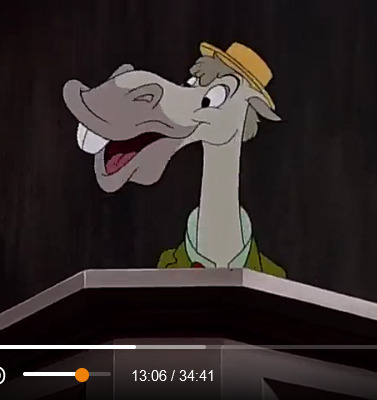

Badger, however, sounds like a Scotsman - the worst kind of stage Scotsman at that - rather than how I used to "hear" him as a C. Aubrey Smith-voiced crusty retired colonel.
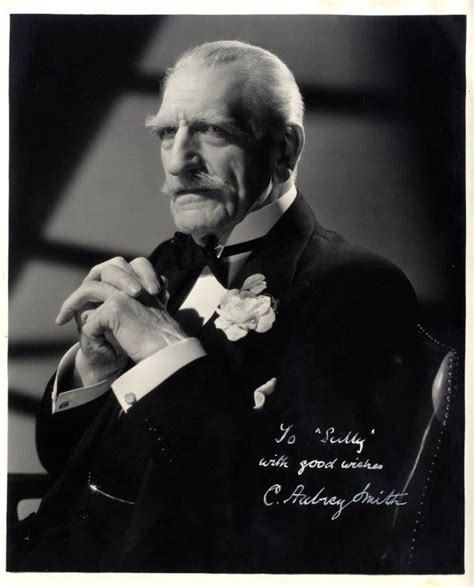
That, however, is just personal preference.
However, Disney's Badger is not a proper British (more correctly, European) badger, Meles meles. Here's one, which though not the most amiable of beasts in reality, still manages to look fairly affable ("I say, old chap, whatever are you looking at?")

Instead he's a North American badger, Taxidea taxus, which not only has a less affable expression ("Hey, bud, you. Yeah, you. You lookin' at me? You lookin' at ME?") but, more important, different stripes.

Here's Disney's version alongside mine. The correction took about five minutes of pixel-tweaking.
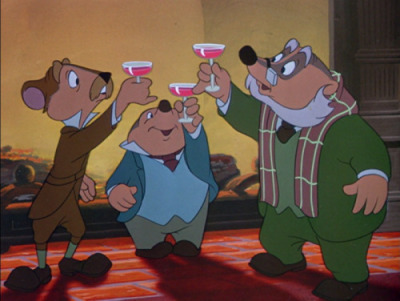
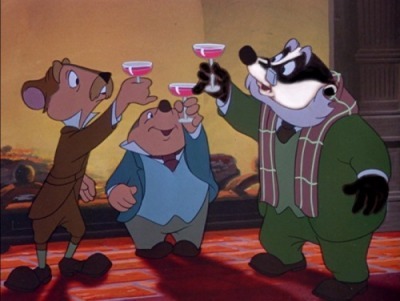
Disney's animators could have got it right from the outset just as easily, because I'm pretty sure the reference library which provided costume info for Rat's tweed Norfolk jacket and britches included picture-books of natural history.
Come to that, any "The Wind in the Willows" after the unillustrated first edition would have been enough, and there must have been at least one copy lying around for story adaptation and scene-description purposes.
The first illustrated edition came out in the UK in 1931, and its artist was, at author Kenneth Graham's request, the very same E.H. Shepard who had illustrated the Pooh books just a few years previously...
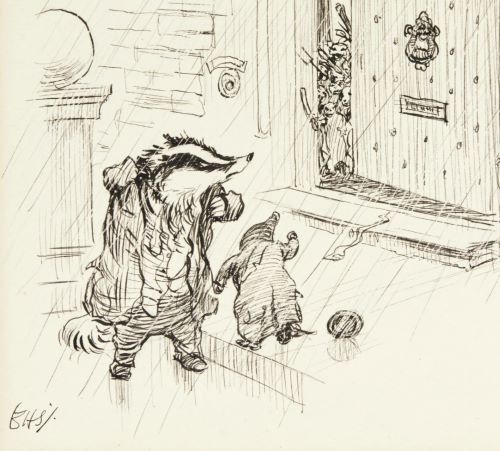
...while this Arthur Rackham colour plate is from an edition published in 1940 in New York.
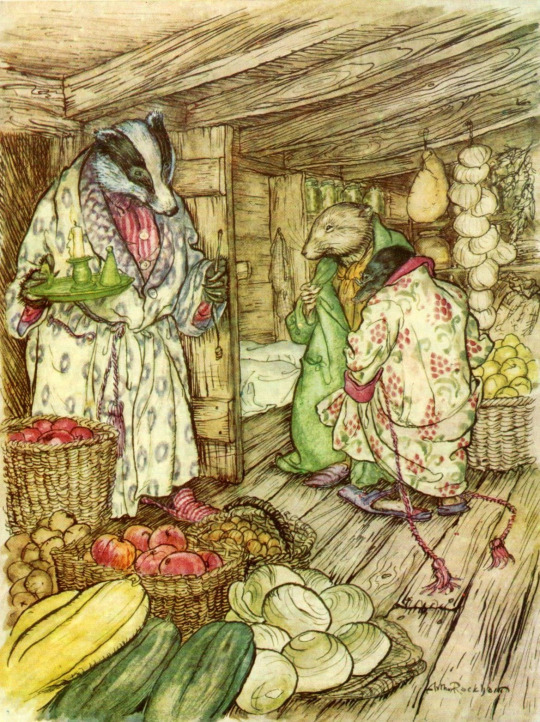
So those books wouldn't have been impossible for Disney to get.
The problem, however, is that if a word ("badger", for instance) is well known to mean one thing here, it may be Too Much Trouble to find out if the same word means something else there, with the result that finding out can sometimes come as rather a surprise.
Check the UK / US meaning of "suspenders" to see what I mean... ;->
#Americanisation#Disneyfication#Winnie-the-Pooh#The Wind in the Willows#British and American English#separated by a common language
1K notes
·
View notes
Note
Honestly thought I'd never hear the word "usborne" again. My mom used to live and breathe that company, and while I certainly don't regret a fair chunk, I do find it amusing as I look back now. I legitimately thought it had fallen off faster than Juice+.
In reference to a post where i mention my kid has the usborne “see inside germs” book.
So if people don’t know, usborne is a weird publishing company that has done indispensable books for British children for generations; they’re in every library, school and nursery, and have shelves devoted to them in every bookstore. They are how many people learned to read, and are the originators of many hyper focuses. They’re famed for doing educational lift the flap books for all ages, like “see inside your body”, as well as as the ubiquitous touch-and-feel series, “that’s not my….” In which a mouse comments improbably on various creatures not being their creature. “That’s not my dragon,” the mouse says, inviting you to stroke a dragon with a patch of fur on it, “its tummy is too soft. That’s not my dragon,” on the next page, where the dragon’s ears are lined with textured paper, “its ears are too bumpy.” This seems like such an inefficient way to find one’s missing dragon, a fact that simmers underneath you through endless repetition. Why does the mouse own so many things (pirates, ducks, polar bears) and why is it interrogating other people’s pirates etc by feeling their legs.
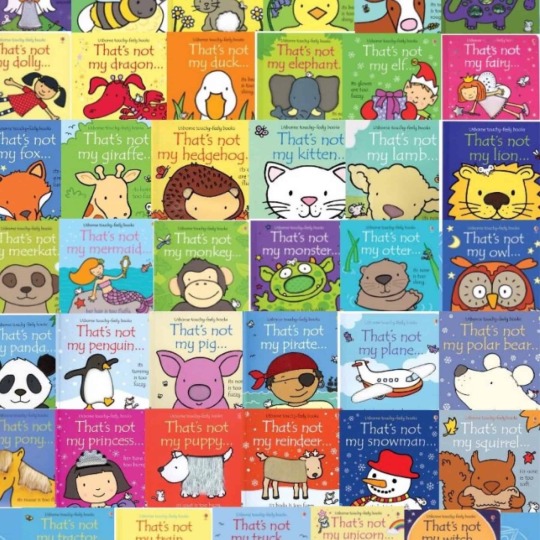
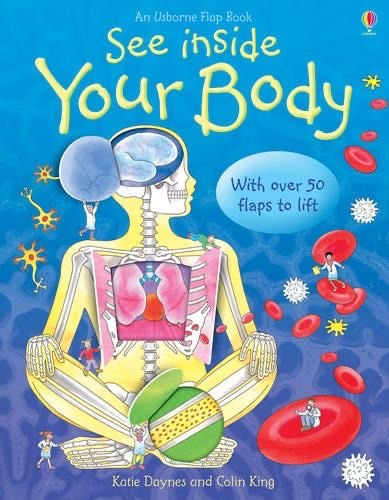
At any rate, turn a parents’ house upside down and these books fall out.
Which is why it’s completely hilarious that they are also an MLM.
Well. Kind of. In the old school sense. It’s less about signing up a pyramid scheme and more about getting a random citizen to buy a crate of perfectly popular books and try to sell them on from their home. It’s very traditional for Mums On Maternity Leave to do this. Pre-social media and online ordering, they’d hook up other mums at toddler group. Today, they post awkwardly on social media. The idea is that buying from another parent is cheaper than the bookstore, and they get to keep the markup. They get intense about things, and I believe they attend conferences. Nobody makes a huge amount of money and it’s unclear how undercutting local bookstores is helpful; it’s also basically the same RRP as Amazon I think.
And the books are perfectly respectable and sell perfectly well in bookstores.
So. Like. This marketing scheme is completely weird. Why?? Why does it still exist? People buy the books normally! You don’t need to promote them aggressively! You don’t need elaborate independent local middlemen schemes! You can just buy them! I have never understood this. I just file it under one of those weird mat leave hustles.
But don’t worry OP. They’re still going. They’ll never stop. The thing is that your mom got bored and online sales probably ate whatever residual profit margins were left and it’s probably very liberating for everyone to grow out of the “that’s not my cow” stage, but Usborne books are going strong.
1K notes
·
View notes
Text
O U R


PAIRING: uni student! han taesan x uni student! fem! reader

SUMMARY: Romance developed after a book was dropped on his head. Han Dongmin or Taesan, liked his quiet time. After spending time with his friends, he needed to get away a little. Finding a quite spot in the library by a shelf, Taesan peacefully read to himself and then all of a sudden, blop, a book was dropped on his head. He rubbbed his head, cursing to himself, before looking up to yell at the person that dropped the book on his head. Taesan froze. He couldn't hear anything. All he saw was her face. She was beautiful. He only snapped out of it when her figure started to disappear. Shoot, Taesan forgot everything she said and could only remember the image of her face.

I forgot everything but your face ᶻ 𝗓 𐰁

GENRE: social media au, college au, love at first sight, fluff, angst, humor, and crack
WARNINGS: cursing, drinking, mentions of kms/kys jokes, bad jokes, and more!
FEATURING: jungwon, niki, and sunoo from enhypen, ningning from aespa and others!
STATUS: ongoing CREATED: 09.09.2024 PUBLISHED: 09.20.2024 ENDED: . . .
TAGLIST: [CLOSED] comment a 🐝 to be added

PROFILES
101 % tired | leehan's aquarium pt.1 | leehan’s aquarium pt. 2
TEASER
PART 01 | riwoo on the loose
PART 02 | australian twinkle toes
PART 03 | sungho scheming
PART 04 | emergency (written)
PART 05 | TBH
PART 06 | y/n has a crush
PART 07 | jungwon’s interrogation
PART 08 | diner of fate (written)
PART 09 | what are you british ??
PART 10 | MY NAME IS JUNGWON
PART 11 | heHeHEEHEe (written)
PART 12 | SUNGHO FIRST WIN!! (written)
PART 13 | taesan vs. sungho, 2024
PART 14 | wanna see something funny?
PART 15 | he’s usually not that much of a loser (written)
PART 16 | leehan's even bigger aquarium
PART 17 | gongfourz
PART 18 | is he . . . ?
PART 19 | are you a bank loan?
PART 20 | juice say oh
PART 21 | you have a problem (written)
PART 22 | what a pretty view (written)
PART 23 | hypothetically jealous
PART 24 | my eyes are starting to sweat
PART 25 | cat boy (written)
PART 26 |
PART 27 |
PART 28 |
PART 29 |
PART 30 |


© ALL RIGHTS RESERVED, lxvsiick, 2024
#kpop#boynextdoor x reader#boynextdoor#myung jaehyun#han dongmin#taesan#kim woonhak#kim donghyun#leehan#lee sanghyuk#park sungho#boynextdoor au#social media au#boynextdoor fanfic#lxvsiick </3 | O U R#han taesan x reader#han taesan#taesan boynextdoor#taesan x reader#taesan smau
615 notes
·
View notes
Text
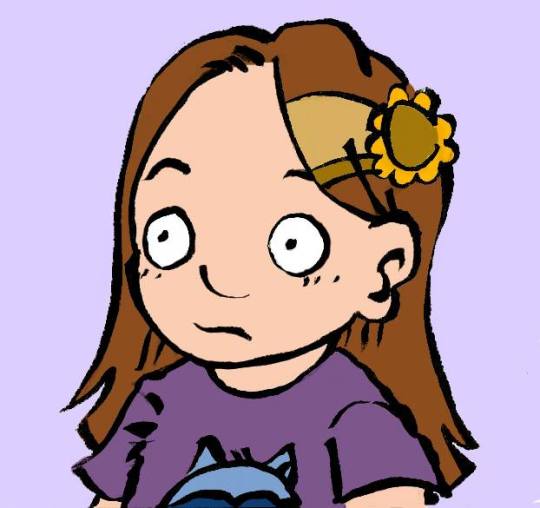
This September is Assigned Male Comics' 10th anniversary! What a ride it has been. What started off as doodles during class when I was still at school changed my life in so many ways. It brought me new friends, adventures, and love. It made me learn about art, about the world, about myself. (I also learned English - at the beginning, it was my friends who were translating the strips!) I am eternally grateful for the community that was created around these characters.
It hasn't always been easy. You probably saw firsthand at one point or another how threats and verbal abuse have been a daily routine of the past decade for me. I'm thinking about that time I got doxxed and forced into hiding, or when ne*-naz*s stormed a library I was speaking at, or when a certain hate group (the British government) published a letter in the media because my comics are threats to civilisation and whatnot. I look back at all these things, and sure, a part of me feels tired and exhausted, but also proud. Because despite everything, I chose to keep doing this, and I'm still here. It has to be worth something.
This year has been a struggle of every instant. I'm focusing on keeping my head above the water. Your help during the hardships of last winter has been so vital, and I thank you for being here and for your patience with order delays! The situation brought my husband and I to our knees, and we're still counting pennies to be able to afford groceries. Making art in this context has certainly not been the easiest.
Still, I find joy in making these comics. Creating something empowering and entertaining for trans communities and their allies feels essential now more than ever. Meeting so many of you during my speaking tours has been life-changing, and I cherish the memory of each of these encounters. I miss you all, by the way! I can't wait to be back on the road.
In the meantime, I'm announcing today a virtual speaking tour for the next few months! I will accept invitations from associations, groups, schools and libraries. I will make a separate post about it in the next few days, but feel free to message me now for more details.
Thank you for being part of this journey.
To many more!
xx
Sophie
To subscribe and help me towards financial stability : www.patreon.com/assignedmale
To get me a 10th anniversary coffee so I can stay up late partying (as if) : www.ko-fi.com/sophielabelle
(pictured : the page's first profile picture!)
530 notes
·
View notes
Text










Botanical illustrations of ferns taken from 'The Octavo Nature- Printed British Ferns' by Thomas Moore.
Published 1859 by Bradbury and Evans.
Wellcome Library.
archive.org
328 notes
·
View notes
Text




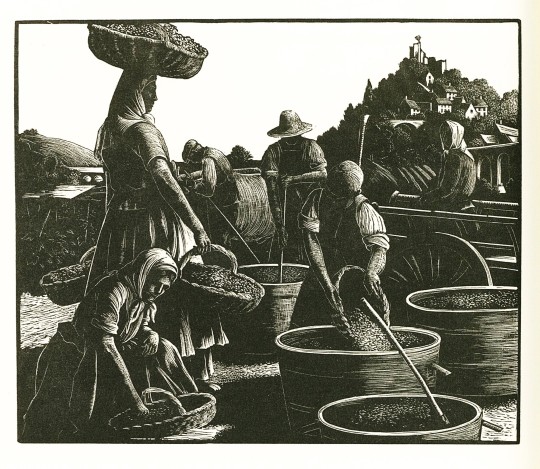




Wood Engraving Wednesday
CLARE LEIGHTON
Here are a few engravings from a recent acquisition for our reference collection on the engravings of English/American artist, writer, and illustrator Clare Leighton (1898-1989), Clare Leighton's Rural Life: An Anthology, published in Oxford by the Bodleian Library in 2023. The book was edited with an introduction by Leighton's devoted nephew David Leighton (1931-2022), who sadly did not live to see its publication. Clare Leighton was one of the most prolific and highly regarded wood engravers of her time, leaving behind a body of work that reflected her rural life in Britain and North America.
During the 1930s, as the world around her became increasingly technological, industrial, and urban, Leighton portrayed rural folk and the ancient methods they used to work the land that would soon vanish forever. Her two best-loved publications, Four Hedges (1931) and The Farmer's Year (1933), reflect this passion for the British countryside. Less well known are her books illustrating and describing rural life in the United States, where she emigrated and became a naturalized citizen in 1945. Leighton also spent time in Canada with the logging community, winning the respect of Canadian lumberjacks by adopting their way of life. Her wood engravings depicting lumberjacks in the snow-covered forests of Canada are some of her most evocative prints.
This anthology includes beautifully reproduced extracts and David Leighton's detailed introduction to the artist's life and work, reflecting Clare Leighton's lifelong fascination with the virtues of the countryside and the people who worked the land.

View more posts with work by Clare Leighton.
View more posts with work by women wood engravers.
View more Women’s History Month posts.
View more posts with wood engravings!
#Wood Engraving Wednesday#women's history month#wood engravings#wood engravers#women wood engravers#Clare Leighton#David Leighton#Clare Leighton's Rural Life: An Anthology#Bodleian Library#country life#rural life#harvesting#lumbering#lumberjacks
172 notes
·
View notes
Text
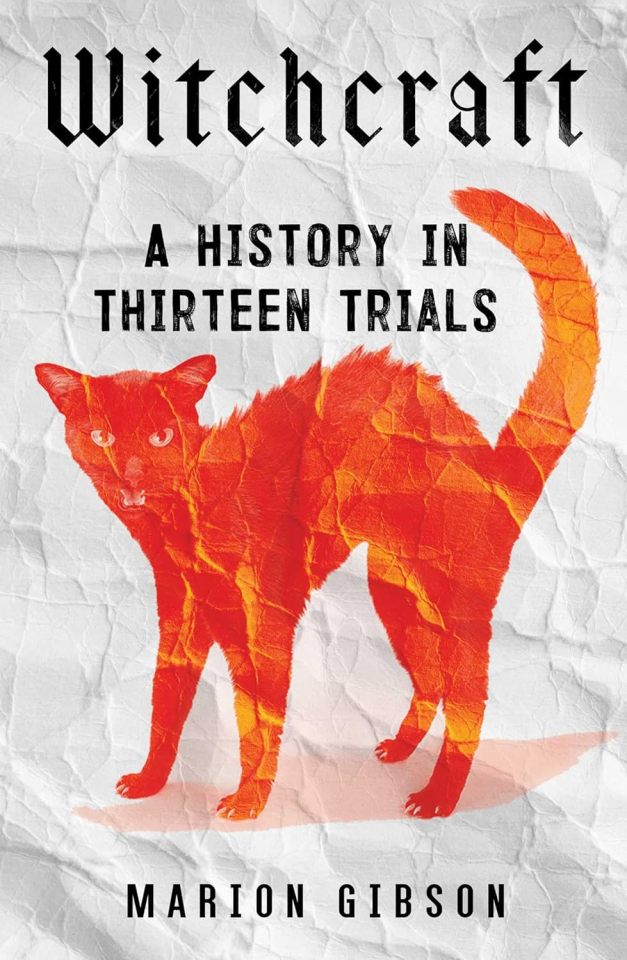
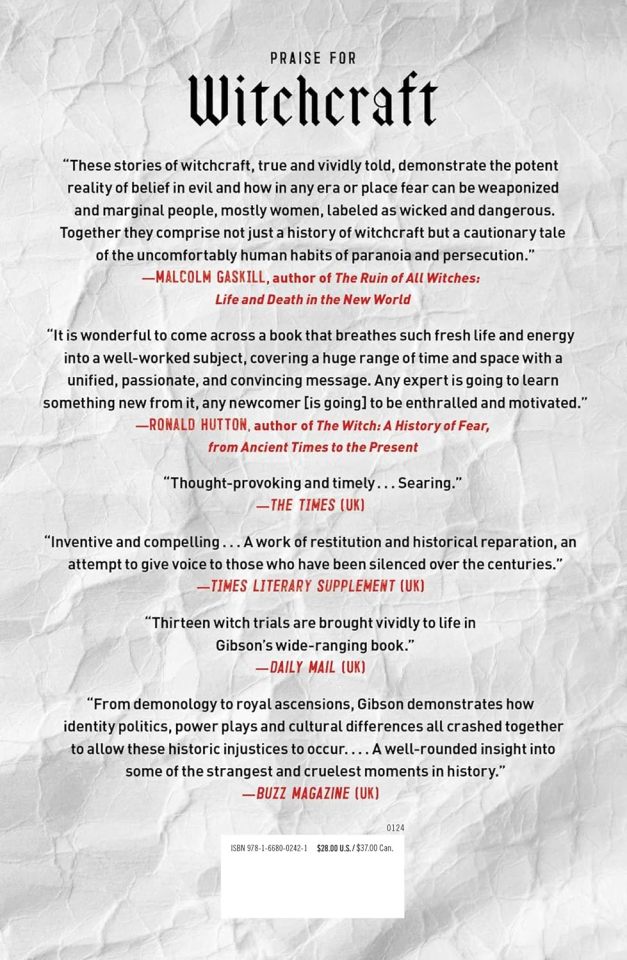
Witchcraft: A History in Thirteen Trials
Marion Gibson, Scribner, 2024.
Just found this book and read some excerpts. I am DEFINITELY recommending this as a must-have addition to witchy reference libraries. I'm also going to be checking out more from this author, as I'm already impressed.
Gibson, who is the author of several books on the history of witchcraft and paganism, traces the development of the idea of demoniacal witches and the public attitudes and prejudices creating them through the course of thirteen landmark trials from around the world and spanning seven centuries of history. More importantly, the author makes clear that although history may remember the victims of these trials as witches, they were no such thing.
From the publisher's description:
National Bestseller A New Yorker Best Book of 2024 A “thought-provoking and timely” (The Times, London) global history of witch trials across Europe, Africa, and the Americas, told through thirteen distinct trials that illuminate a pattern of demonization and conspiratorial thinking that has profoundly shaped human history. This “inventive and compelling” (The Times Literary Supplement, London) work of social history travels through thirteen witch trials across history, some famous—like the Salem witch trials—and some lesser-known: on Vardø island, Norway, in the 1620s, where an indigenous Sami woman was accused of murder; in France in 1731, during the country’s last witch trial, where a young woman was pitted against her confessor and cult leader; in Lesotho in 1948, where British colonial authorities executed local leaders. Exploring how witchcraft was feared, then decriminalized, and then reimagined as gendered persecution, Witchcraft takes on the intersections between gender and power, indigenous spirituality and colonial rule, political conspiracy and individual resistance. Offering a striking, dramatic journey unspooling over centuries and across continents, Witchcraft is a “well-rounded insight into some of the strangest and cruelest moments in history” (Buzz Magazine), giving voice to those who have been silenced by history.
Marion Gibson is Professor of Renaissance and Magical Literatures at the University of Exeter, UK. She is the author of seven academic books on witches in history and literature: Reading Witchcraft; Possession, Puritanism, and Print; Witchcraft Myths in American Culture; Imagining the Pagan Past; Rediscovering Renaissance Witchcraft; Witchcraft: The Basics and, with Jo Esra, Shakespeare’s Demonology. Marion has also edited five books for publishers such as Routledge and Ashgate, published around twenty chapters and articles, and she is General Editor of the series Elements in Magic for Cambridge University Press. Witchcraft: A History in Thirteen Trials is her most recent work.
147 notes
·
View notes